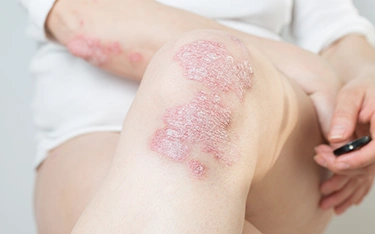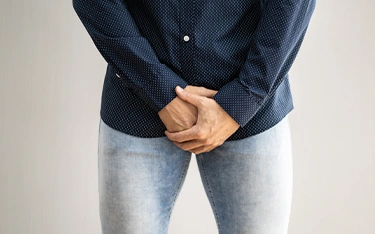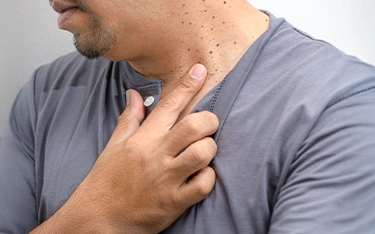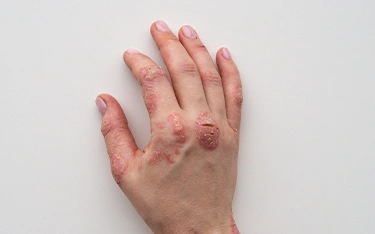FAQs
The early signs of plaque psoriasis often appear as small, red or purple patches of dry, scaly skin that gradually thicken and spread. On the scalp, it may look like persistent dandruff, with silvery-white flakes and itchiness. These lesions may be itchy, dry, or slightly raised. Early detection is important, especially if the plaques appear symmetrically on both sides of the body. If left untreated, they can become thicker, more inflamed, and harder to manage.
Topical treatments for plaque psoriasis often include corticosteroids, vitamin D analogues (like calcipotriol), salicylic acid preparations, and coal tar-based ointments. These creams help reduce inflammation, itching, and scaling. However, long-term use of steroids may lead to side effects such as skin thinning. At Dr Batra’s®, we focus on safe and natural alternatives like personalised homeopathic medicines that treat psoriasis from the root without the risk of side effects.
Managing scalp psoriasis at home involves gentle daily care. Use medicated shampoos containing coal tar, salicylic acid, or ketoconazole, as recommended by your doctor. Avoid scratching, which can worsen inflammation or cause infection. Keep the scalp moisturised using suitable oils or natural serums, and avoid harsh hair products or styling tools. At Dr Batra’s®, we also offer scalp-friendly homeopathic solutions that reduce itching and flaking without damaging the hair or scalp.
Stronger treatments such as phototherapy (light therapy) or biologics are typically recommended for moderate to severe plaque psoriasis that does not respond to topical treatments. These options help manage widespread or stubborn lesions but may carry risks and require regular monitoring. Homeopathy at Dr Batra’s® can often help patients avoid these aggressive treatments by providing long-term relief using natural, customised remedies that gently regulate the immune system.
A consistent skincare routine can significantly reduce plaque psoriasis flare-ups. Gently cleanse the skin with a fragrance-free, mild cleanser. Moisturise twice daily using a thick emollient to prevent dryness. Avoid long, hot showers and choose lukewarm water instead. Wear soft, breathable clothing, and manage stress with relaxation techniques such as yoga or deep breathing. Patients at Dr Batra’s® receive individualised lifestyle and skincare guidance to support their treatment and prevent flare-ups.
At Dr Batra’s®, we create personalised treatment plans based on a detailed consultation that evaluates your physical symptoms, lifestyle, emotional health, and medical history. Our expert homeopathic doctors identify underlying triggers, such as stress or immune imbalances, and prescribe natural remedies that work to correct the root cause. This holistic, side-effect-free approach ensures long-term relief, improved skin condition, and better overall wellbeing - without the risks of steroids or invasive treatments.





